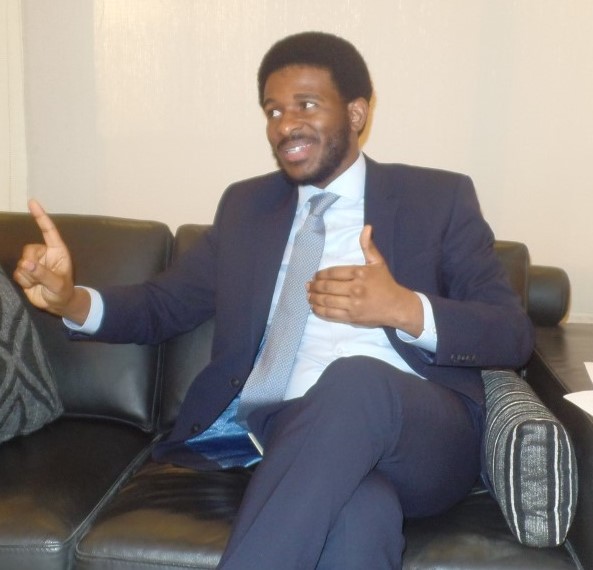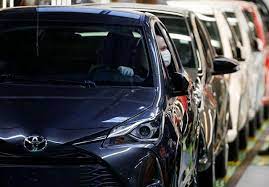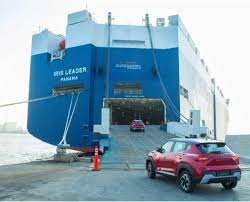

Toyota is still number one in Nigeria, Managing Director, Toyota Nigeria Limited (TNL), Kunle Ade Ojo has said.
In a chat with some Motoring Journalists and Editorial Team of Nigeria Auto Journal, Ade Ojo explained that the initial challenge with stock has been rectified.
He said: “Toyota is still in top position in Nigeria. As I said earlier, we had issue with stock some time ago and it affected us. That has been resolved. We’re still in top position and we’re going to remain top at the end of the year (2018)’’.
“
Explaining further, Ade Ojo said the company work directly with manufacturers: “Since we work with manufacturers, there is what we call cycle lead time and cycle of ordering, production and arrival.

“In 2017, we had challenges with finance. Our business partners, the manufacturers were also very risk averse. So, there was limitation on what we could order. By the end of 2017, we had ordered vehicles that were going to be arriving by April/May this year. So, that affected our stock because lead time for ordering was stretched last year.
“Normally, it used to be between five and seven months from order to arrival. Last year, even till date, it’s between six and eight months.
“So, I am ordering now and vehicles are going to be arriving in eight months. I have a short time to react if the market suddenly changes. That was one of the things that impacted us and we could only recover in the second half of the year”.
Part of the interview read:
Beyond recession, what can you say accounts for the rising cost of new vehicles in the country?
I wouldn’t say prices of vehicles are rising. I don’t understanding why you assume that prices are rising because if you take for example, Toyota, last year when the forex was scarce and the prices went up to as high as N500 to a dollar, our prices were really high.
Yaris last year was going for about N13 million. We are selling the same Yaris today between N8.75 million and N8.9 million. Corolla reached a peak of almost N20 million at that time. Today, the same Corolla is going for around N15 million. So, prices have actually dropped. The prices of different models have been dropping with the drop in the prices of exchange rates. So, we have not increased any of our prices at all. Rather, we have gone down on prices.
How would you assess performance this year compared to 2017?
If you look at sales, we are down this year compared to last year, even though there is an increase in the market. We are forecasting that the market will end this year between 11,200 and 11,500 from a position of about 9,000 last year. Last year, we did about 2,300 units and we are going to be ending the year at between 1,500 and 1,700 vehicles, which is a drop from where we were last year. Last year, we came into the year with a not healthy stock. It made us to face challenges with stocks in the first half of the year, which impacted our performance and allowed some of our competitors to get very close to us but as of the third quarter of the year, we have managed to pull ourselves from them gradually and we are gradually regaining the lead.
But compared with last year, we’re still going to end lower and next year we’ve been working to also build up our stock gradually to prepare ourselves for 2019 so that we don’t get into the same situation that we got into in the first half of this year.
So, there is some erosion but we’re working to recover that as far as sale is concerned.
If you’re talking about how that relates financially, I think we’re still very healthy, even though if you look at our turnover, there is a drop because we’re selling lesser than we did last year.
However, you will recall that at Toyota Nigeria, we have made risk management part of our culture and we observe the market situation to determine how we react and things we need to put in place. So, we had to cut cost on certain things we used to do in the past and we’re also trying to make sure that we maximize where we can get some additional returns such that we’re still going to end up this year in a good state. It may not be as good as last year but relative to the performance of the economy, we’re doing okay.
In the past, there were good sales in the last quarter of every year and considering that we are approaching election season, is that trend still being sustained?
That trend actually stopped during the last election in 2015. Between the last quarter of 2014 and the first quarter of 2015, there was no sale momentum. In fact, it was the opposite. We actually did more in the first quarter of 2014 than we did in the last quarter. I can’t really say what the reason for this is, but I think the country is changing. We have had two elections in the country since 2015 – Ekiti and Osun – but sale figures did not change during those elections. Maybe, they bought from other dealers, but for Toyota Nigeria there were no purchases from any of our dealers. We’re not even getting enquiries from INEC for the pick-ups they will use and all that. So, since it happened during the last election, we are envisaging similar thing is going to happen during this election, and that’s the kind of thing we’re seeing right now. There hasn’t been any surge in demand for vehicles. Coupled with that, the economy is beginning to enter challenging times. The economy hasn’t yet bottomed out. Everybody is still trying to gauge what is going on as far as the country and the economy are concerned.
We are all aware of the issue of forex. Then, there is the issue of the debt level of the country. I understand that 50 percent of the country’s revenue is being used to service debts. Last year, we used our cash to do much of our business. Banks were not lending. This year, we’ve been able to borrow money from the banks – it’s been a bit better. But we’re getting to the point again where banks are saying they are facing liquidity challenges. You have facility with banks and you want to draw on it and the banks are telling you ‘sorry I can’t give you – I don’t have the cash to give to you’. We’re already seeing these signs. So, what is going to be the impact of the dollar not being available next year to do the business? You don’t know, so you have to plan yourself against all these things that we’re seeing. So, we are already internally planning and doing the necessary things to ensure that it doesn’t impact us too negatively when we enter 2019. So, there is no major surge as of now, and it was the same thing during the last election.




